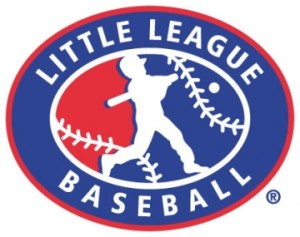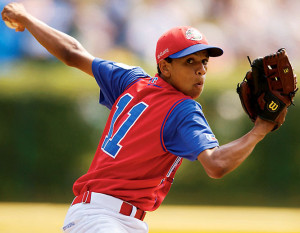
I have been coaching youth sports, particularly Little League, since my kids have been old enough to be interested – about 10 years now.
My oldest son plays “travel” baseball, where individual teams organize separate of summer Little League and play each other in area and interstate tournaments run mostly by commercial companies. A few big outfits run national tournaments, like Cooperstown Dreams Park in New York, Ripken Baseball in South Carolina and Maryland, Big League Dreams in Texas, and ESPN Wide World of Sports in Florida. When you travel to these tournaments, you see a wide range of baseball talent and ability, from local recreational teams taking a stab at the “big stage” all the way up to teams who recruit interstate and fly in ringers to pitch in key championship games.
You see baseball being enjoyed by kids, parents, coaches, umpires and plain old fans. You see the essence of American sporting life, which feeds the professional game but also simply grows kids steeped in the grand American tradition of sportsmanship, perseverance, weathering adversity, teamwork and leadership.
You also see cheaters.
Little League Shapes Our Youth
Every year my son has been involved in Little League, I see the best of the sport, but I also see adults willingly leading kids down the road of dishonesty and a lack of integrity.
Rolled and shaved bats, which accelerate and optimize the break-in process and performance of a composite baseball bat, represent a danger to players and provide an unfair advantage, according to league and tournament rules. Yet companies market them actively and kids use them all the time. On the baseball field, you can see and hear the ball pop off a modified bat. When an average team’s number 8 hitter is reaching across, off-balance, to the outside of the plate and stroking the ball 300 feet to the fence off the end of the bat, and you hear that distinctive ping, different from the sound of the ball off a stock bat, you know instantly what is going on.
Age restrictions are broken all the time. Tournaments require proof of age, which is as easily falsified as a driver’s license for a college kid seeking to enter a bar under age. Tournament directors’ enforcement power is limited by the integrity of the coaches who sign up their teams to play. Hardly anyone affiliated with youth sports can forget the case of Danny Almonte, whose team reportedly falsified his birth certificate to allow the 14-year old to dominate boys 2 years younger in the 2001 Little League World Series. Age verification compliance procedures have improved since this case drew international attention, but they are at the mercy of the resolve of a coach committed to cheating. When you see a 6’4”, 190 pound “12-year old” throwing 76 mph gas with movement, you know he is either the next Randy Johnson or he is actually 14 years old and post-puberty.
Tournament directors and umpires are virtually powerless to stop it; the sophisticated equipment and processes required to determine whether a bat has been doctored or a birth certificate is genuine are expensive and unavailable in most locations.
What Are We Teaching Our Kids?

It would be a mistake to read too much into this phenomenon, but it also would be a mistake to ignore it as insignificant. Almonte, a kid with incredible baseball skills, was damaged goods after the nationwide coverage of his cheating, and he never fulfilled his potential. After the cheating scandal, no Major League Baseball team would touch him, even if he had the talent to succeed on the big stage.
The fault of Almonte’s fall lies with him to some extent, of course, but he was only a 14-year old kid. The people who failed him the most were his parents and coaches, people whom society counts upon to steer children morally and ethically. They broke a solemn obligation. And for what? A Little League World Series trophy, at the expense of the rest of Almonte’s life? They gambled with the kid’s future and lost badly. Only Almonte is the one who had to pay the piper.
The habits of situational ethics follows these kids into real life. Once they have been taught that gaining an unfair advantage is acceptable so long as you do not get caught, is there any surprise that performance enhancing drugs have pervaded professional sports; where the financial stakes attached to superior performance are mind-boggling? Should we be shocked when Wall Street nearly breaks the economy over subprime mortgage lending, massive financial fraud, and insider trading? Is there any surprise when politicians rig elections or engage in corruption, or senior military leaders engage in manifestly unethical conduct? Why are we shocked when doctors commit insurance fraud and professional misconduct for personal gain, and lawyers engage in corruption and incivility to win?
The ethics of all these professions are grounded on society’s basic communal moral principles. Youth sports comprise a huge part of that social ethos from the first days a child can lace up cleats or dribble a basketball. Integrity matters in life – but in youth sports, for some coaches and players, it appears to be optional. If we truly care about ethics in our public, professional and political lives, it might be time to police it better from an earlier age, and to teach kids why integrity is important, beyond mere rule-following.


Hello! I’ve been reading your website for a long time
now and finally got the courage to go ahead and give you a shout out from Dallas Texas!
Just wanted to mention keep up the excellent job!
Greetings from Ohio! I’m bored at work so I decided to browse your website on my iphone during
lunch break. I really like the info you provide here and can’t wait to take a look when I get home.
I’m shocked at how fast your blog loaded on my cell phone
.. I’m not even using WIFI, just 3G .. Anyways,
awesome site!